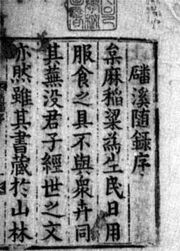Biography:Yu Hyeongwon
From HandWiki
| Korean name | |
| Hangul | 유형원 |
|---|---|
| Hanja | 柳馨遠 |
| Revised Romanization | Script error: The function "transl" does not exist. |
| McCune–Reischauer | Script error: The function "transl" does not exist. |
| Pen name | |
| Hangul | 반계 |
| Revised Romanization | Script error: The function "transl" does not exist. |
| McCune–Reischauer | Script error: The function "transl" does not exist. |
Yu Hyeongwon (1622–1673), also spelled as Yoo Hyung-Won, was a Korean philosopher and politician. He was a Neo-Confucianist and science scholar of the Korean Joseon Dynasty. He was Korean pioneer of the early silhak ("practical learning") school[1][2] as well as an avid social critic and scholar of the late Joseon period. He was the disciple of Misu Heo Mok and second cousin of the silhak scholar Seongho Yi Ik.
Yu hailed from the Munhwa Yu clan, and many of his extended family members held high official positions in the Joseon government.[3][4]
Works
- Bangyesurock(반계수록 磻溪隧錄)
- Bangyejip(반계집 磻溪集)
- Baekgyungsajam(백경사잠 百警四箴)
- Bangyeilgo(반계일고 磻溪一顧)
- Gunhyunje(군현제 郡縣制)
- Yigichongron(이기총론 理氣總論)
- Nanhakmulli(논학물리 論學物理)
- Gyungsulmundap(경설문답 經說問答)
- Jujachanyo(주자찬요 朱子纂要)
- Yeojiji(여지지 輿地志)
- Gunhyunjije(군현지제 郡縣之制)
- Gihaengilrok(기행일록 紀行日錄)
- Dongguksaksagangmokjorye(동국사강목조례 東國史綱目條例)
- Donggukyuksagibo(동국역사가고 東國歷史可考)
- Sokgangmokuibo(속강목의보 續綱目疑補)
- Dongsaguiseolbyun(동사괴설변 東史怪說辨)
- Mugyungsaseocho(무경사서초 武經四書抄)
- Gihyosinseojulhyo(기효신서절요 紀效新書節要)
- Chungeumjinam(정음지남 正音指南)
- Dojeongchuljip(도정절집 陶靖節集)
- Donggukmuncho(동국문초 東國文抄)
- Jungweowirack(중여위략 中與偉略)
See also
References
- ↑ Kang, Jae-eun, (2006), p.376
- ↑ Silhak Encyclopædia Britannica
- ↑ "Error: no
|title=specified when using {{Cite web}}" (in Korean). Nate / Encyclopedia of Korean Culture. http://100.nate.com/dicsearch/pentry.html?s=K&i=271516&v=44. - ↑ "Error: no
|title=specified when using {{Cite web}}" (in Korean). Nate / Britannica. http://100.nate.com/dicsearch/pentry.html?s=B&i=177973&v=44.
Kang, Jae-eun; Lee, Suzanne. (2006) "The land of scholars: two thousand years of Korean Confucianism", Homa & Sekey Books, ISBN:1-931907-37-4
Site Link
- Yu Hyungwon
- Découvrez la forteresse de Hwaseong entourant le centre de Suwon en Corée du Sud (in French)
- 1656 – "Yojiji (輿地志)" by Ryu Hyung-won (柳馨遠) didn't say "Usan is so-called Japanese Matsushima."


